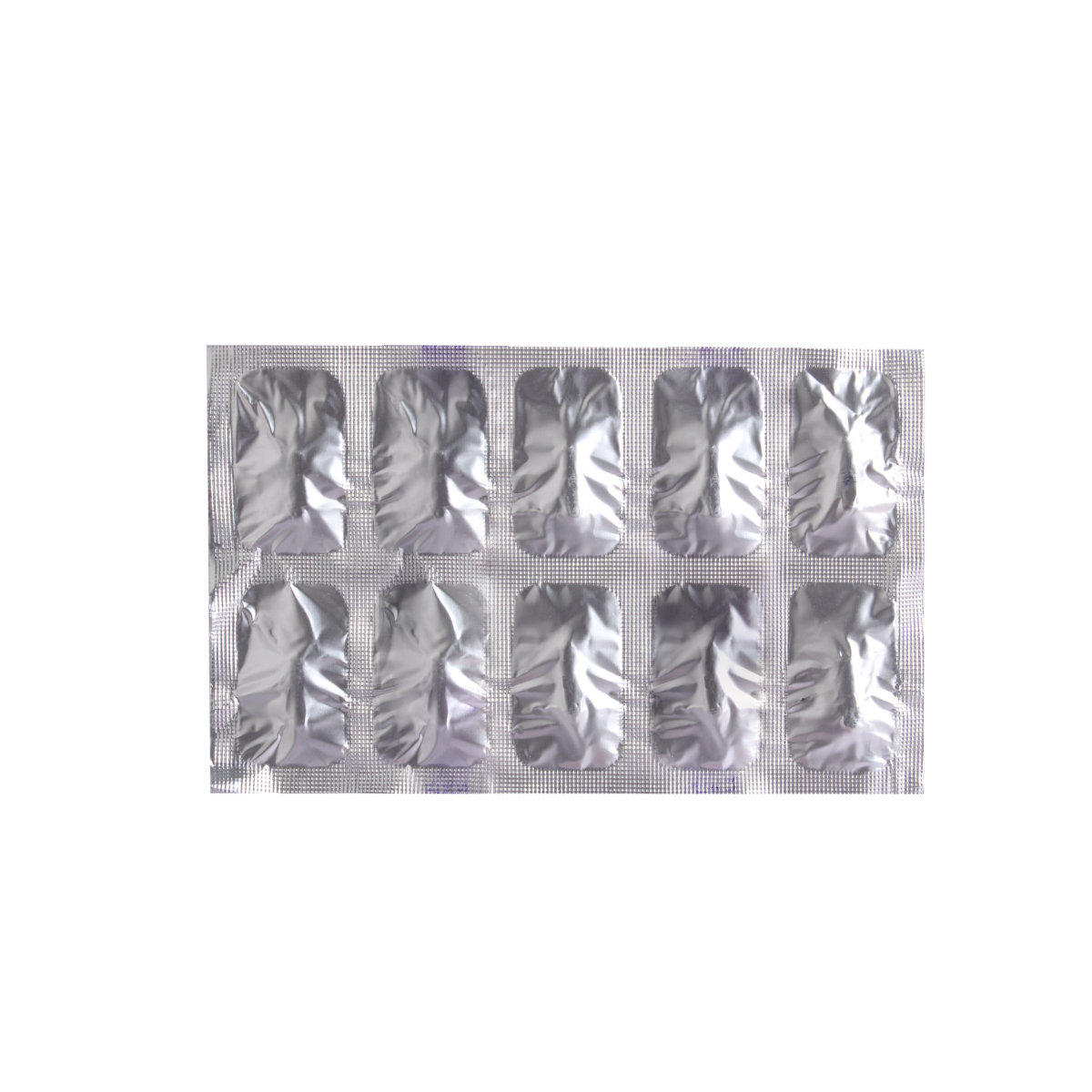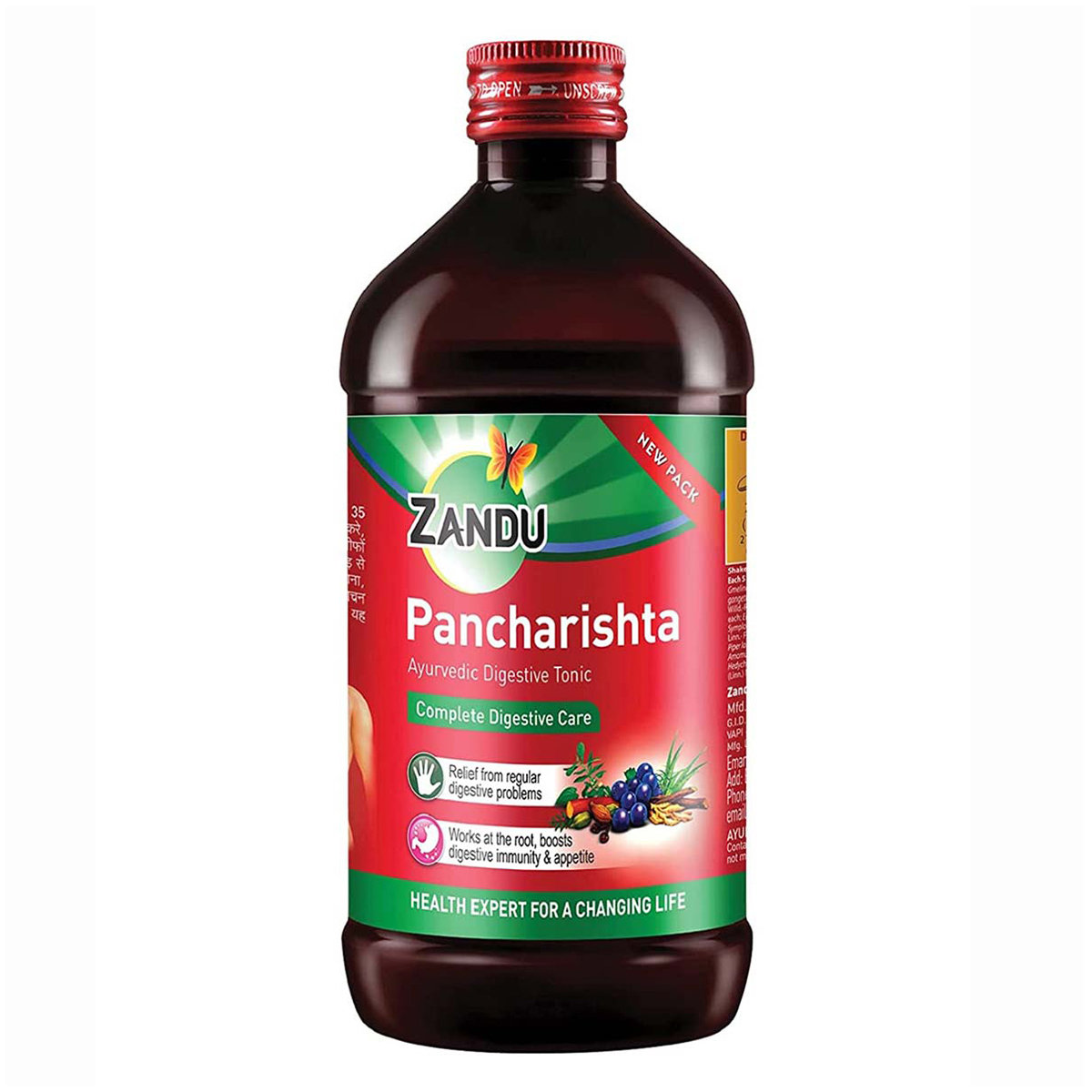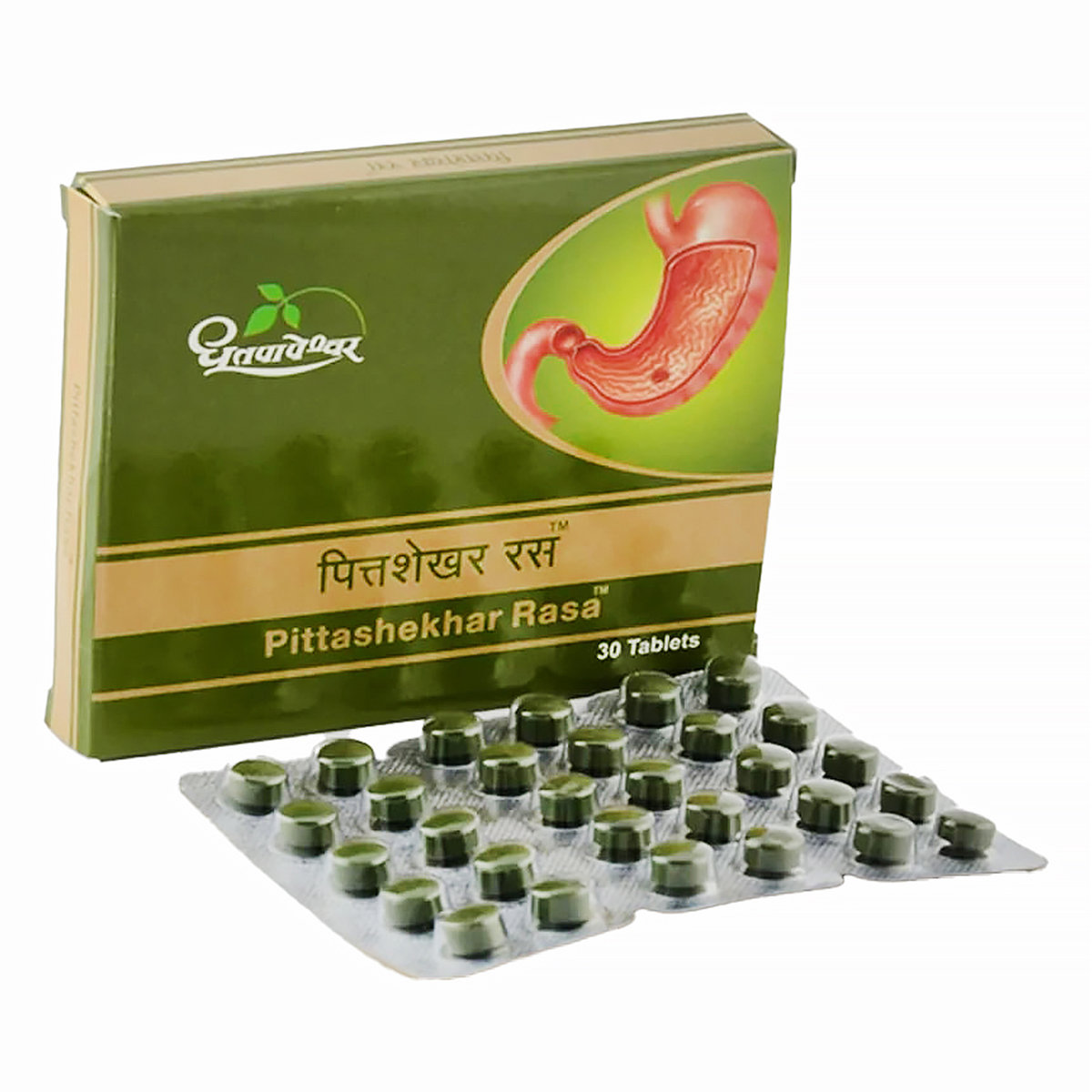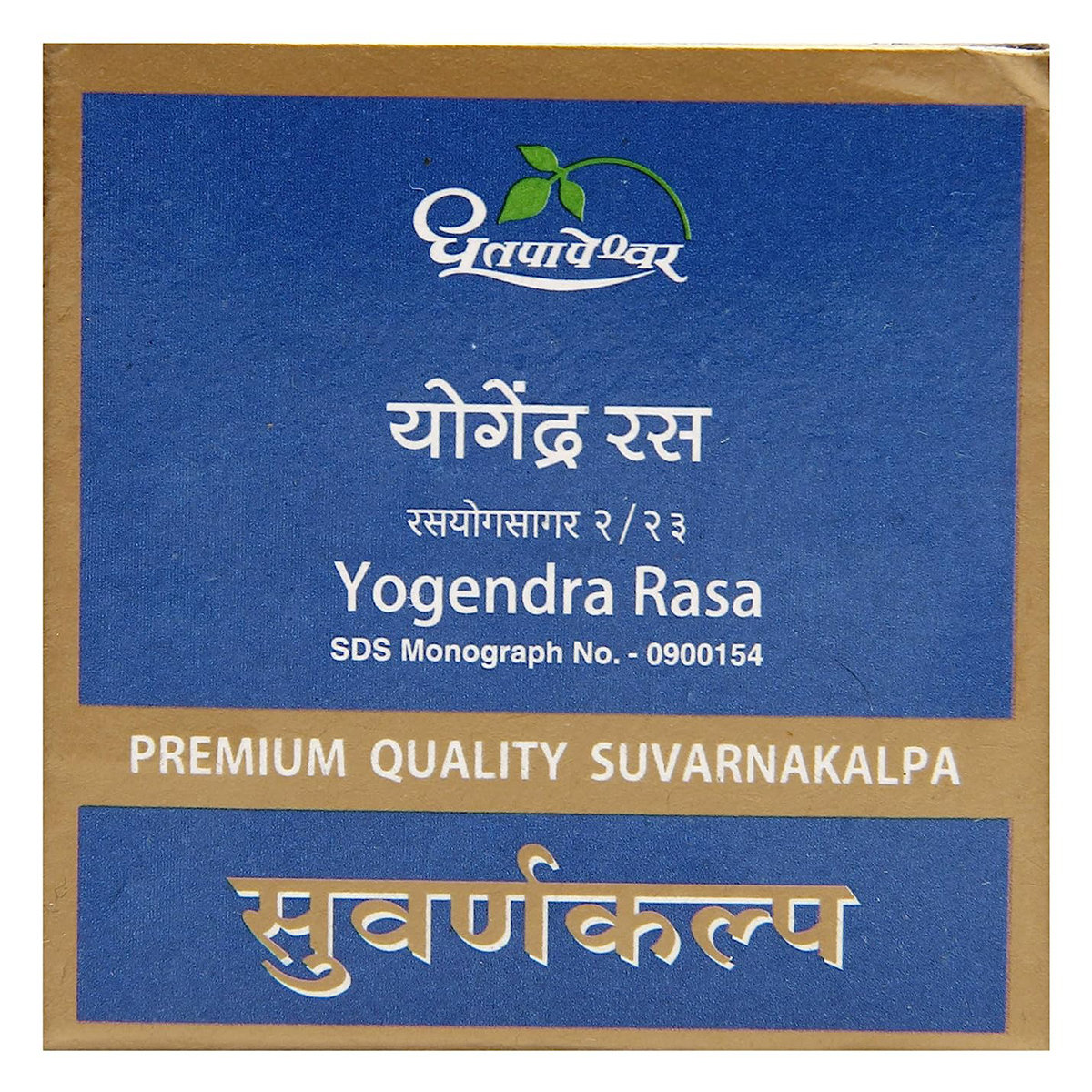Meva C Capsule
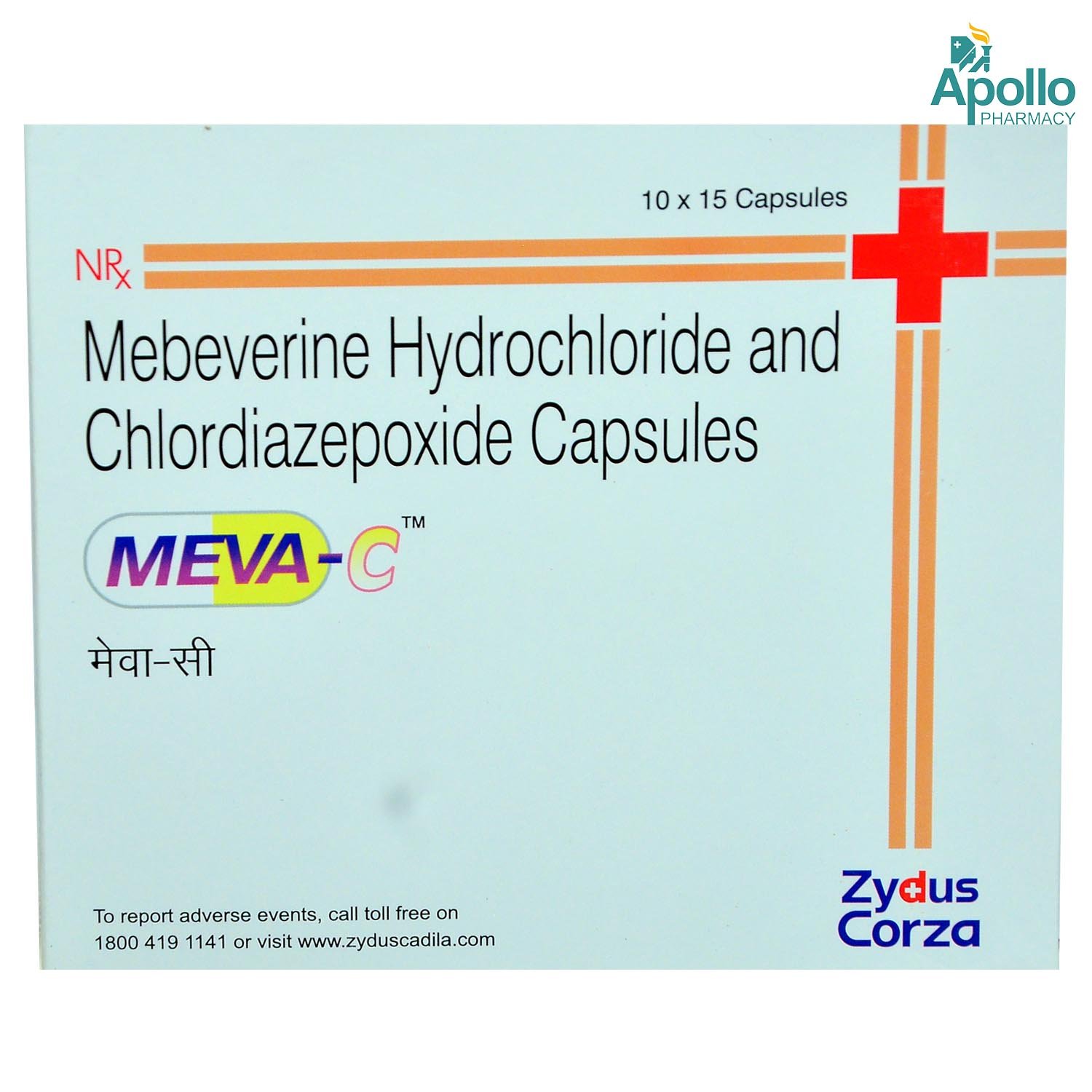
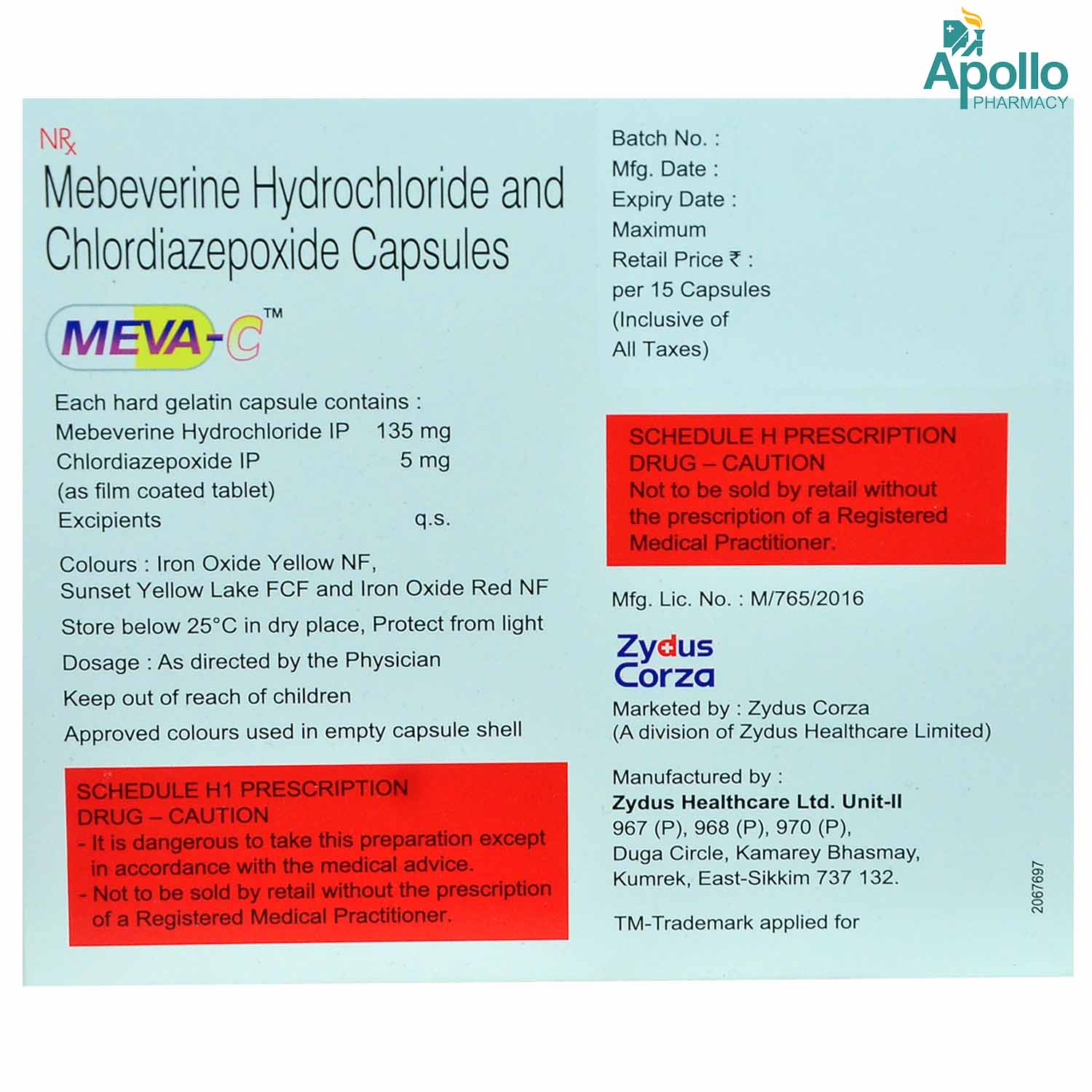
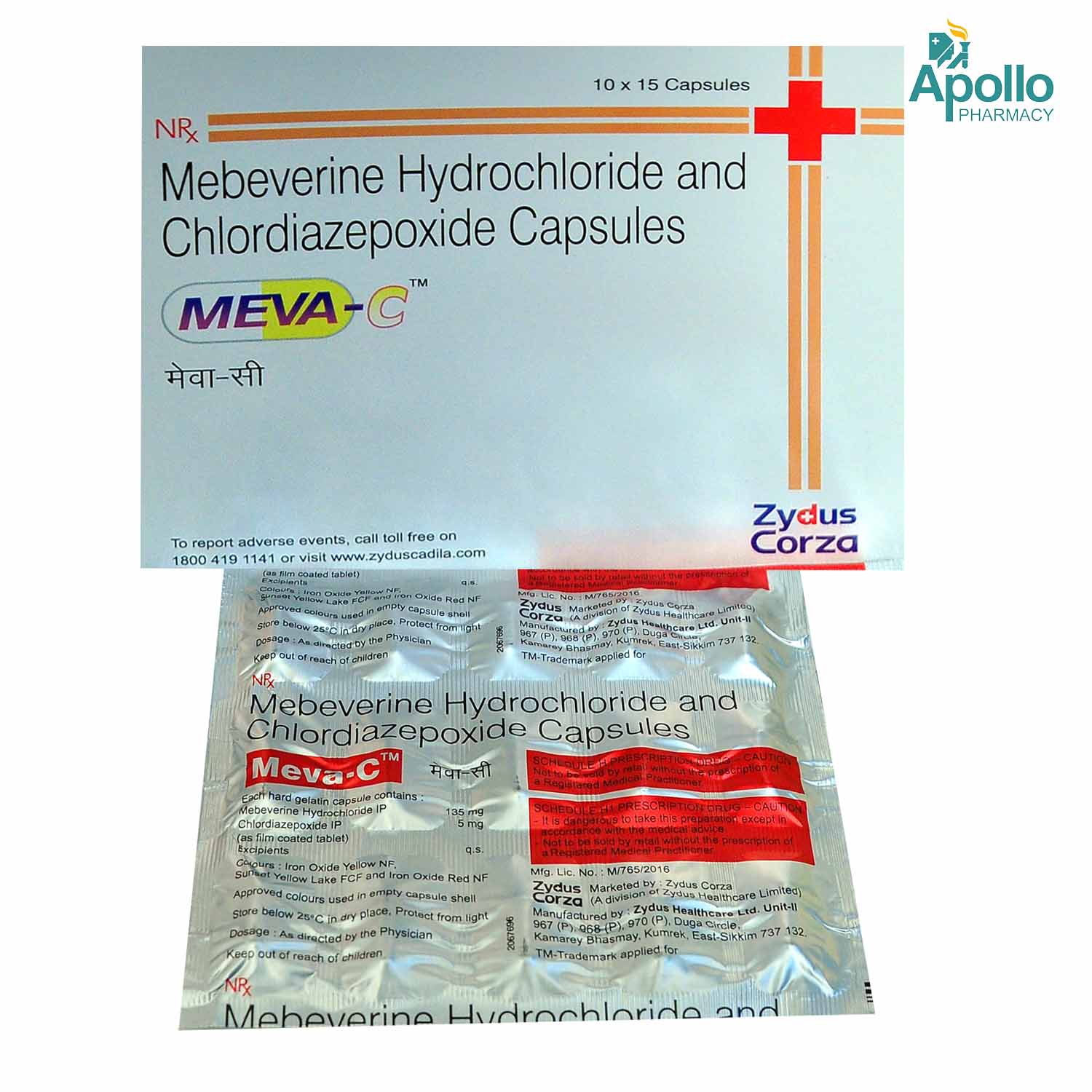

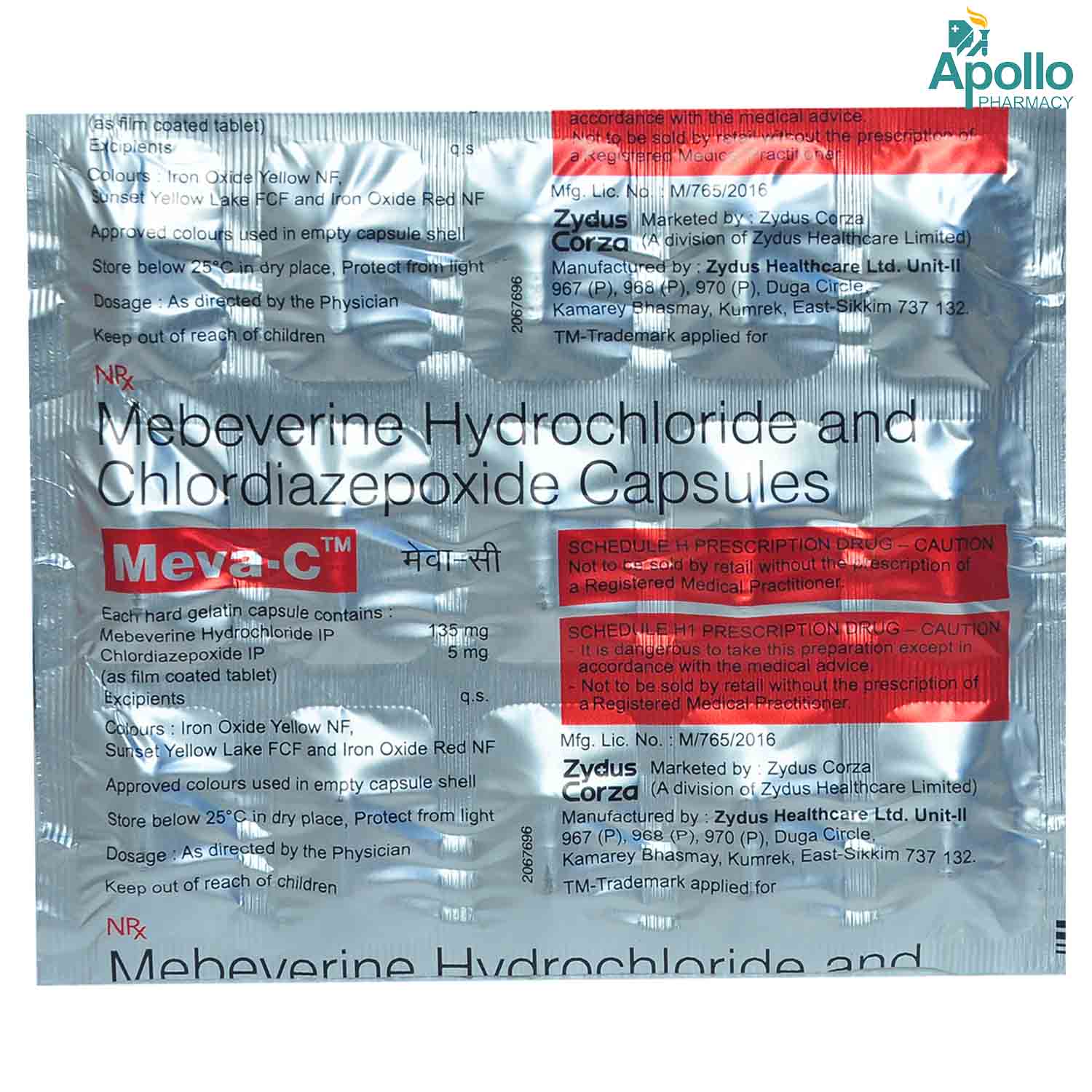
MRP ₹332
(Inclusive of all Taxes)
₹49.8 Cashback (15%)
know your delivery time
Provide Delivery Location
Composition :
Manufacturer/Marketer :
Consume Type :
Expires on or after :
Return Policy :
Selected Pack Size:15
15 ₹298.8
(₹19.92 per unit)
Out of stock

Secure Payment

Trusted by 8 Crore Indians

Genuine Products
Therapeutic Class
Country of origin
Manufacturer/Marketer address
Author Details
We provide you with authentic, trustworthy and relevant information
Disclaimer
Alcohol
Safe if prescribed
Avoid alcohol consumption with Meva C Capsule as it may increase drowsiness. Please consult a doctor before consuming alcohol while using Meva C Capsule .
Pregnancy
Consult your doctor
Meva C Capsule is not recommended for pregnant women as it may cause harm the foetus. However, please consult a doctor if you are pregnant.
Breast Feeding
Consult your doctor
Meva C Capsule is not recommended for breastfeeding mothers as it is excreted in breast milk.
Driving
Safe if prescribed
Meva C Capsule may cause drowsiness, dizziness or blurred vision in some people. So, drive only if you are alert and your vision is clear after taking Meva C Capsule .
Liver
Consult your doctor
Take Meva C Capsule with caution, especially if you have a history of Liver diseases/conditions. The dose may be adjusted by your doctor as required.
Kidney
Consult your doctor
Take Meva C Capsule with caution, especially if you have a history of Kidney diseases/conditions. The dose may be adjusted by your doctor as required.
Children
Safe if prescribed
Meva C Capsule is not recommended for children below 18 years as the safety and effectiveness were not established.
Product Substitutes
About Meva C Capsule
Meva C Capsule belongs to a class of drugs called 'antispasmodics' primarily used to treat painful stomach cramps in the condition of irritable bowel syndrome (IBS) with bloating. Irritable bowel syndrome is a common disease that affects the large intestine. IBS is also known as spastic colon, irritable colon, spastic colitis, and mucous colitis. An irritable bowel syndrome is a group of intestinal symptoms that occur together.
Meva C Capsule is a combination of two drugs: Mebeverine (antispasmodic) and Chlordiazepoxide (benzodiazepine). Mebeverine works by relaxing the intestinal muscle wall, thereby providing relief from painful muscle spasms. On the other hand, Chlordiazepoxide works by increasing a chemical messenger known as GABA (nerve-calming agent) activity in the brain, thereby decreasing nerve cells' abnormal activity. Thus, together it relaxes intestinal muscles, reduces stomach pain caused by spasms, cramps, gas formation, and bloating, and minimizes anxiety levels caused due to stomach discomfort.
Take Meva C Capsule as prescribed. Your doctor will advise you on how often you take your tablets based on your medical condition. In some cases, you may experience drowsiness, dizziness, light-headedness, slurred speech, tiredness, lack of coordination, or difficulty in controlling movements. Most of these side effects of Meva C Capsule do not require medical attention and gradually resolve over time. However, if the side effects persist or worsen, please consult your doctor.
If you are allergic to Meva C Capsule or any other medicines, please tell your doctor. Meva C Capsule is not recommended for children below 18 years of age, as the safety and effectiveness were not established. You are advised not to take Meva C Capsule if you are pregnant or planning for pregnancy as it may cause congenital disabilities (congenital disabilities). Meva C Capsule may be excreted in breast milk. Therefore, avoid taking Meva C Capsule if you are breastfeeding. Meva C Capsule should be used with caution in the elderly as it may confuse them. Do not take Meva C Capsule for longer than the prescribed period as it may cause dependence. Please do not stop taking Meva C Capsule on your own as it might cause withdrawal symptoms. If you have vaginal bleeding or discharge, difficulty in urination, fever, constipation, blood in stools, myasthenia gravis (muscle weakness), anxiety disorders, depression, schizophrenia, manic depression, sleep apnoea (breathing stops and repeatedly starts during sleep), kidney or liver problems, inform your doctor before taking Meva C Capsule .
Uses of Meva C Capsule
Medicinal Benefits Mweb
Key Benefits
Meva C Capsule is a combination of two drugs: Mebeverine and Chlordiazepoxide to treat symptoms of irritable bowel syndrome (IBS) and painful stomach cramps. Mebeverine belongs to the class of antispasmodics that works by relieving contractions associated with smooth muscles of the stomach and intestine. Chlordiazepoxide is a benzodiazepine that increases GABA (nerve-calming agent) activity in the brain and decreases nerve cells' abnormal active cells. Thereby relaxing muscles and reducing anxiety caused due to painful stomach cramps.
Directions for Use
Side Effects of Meva C Capsule
- Drowsiness
- Dizziness
- Light-headedness
- Slurred speech
- Tiredness
- Lack of coordination
- Difficulty in controlling movements
Drug Warnings
If you are known to be allergic to Meva C Capsule or any other medicines, please tell your doctor. Meva C Capsule is not recommended for children below 18 years of age, as the safety and effectiveness were not established. Avoid taking Meva C Capsule if you are pregnant or planning for pregnancy as it may cause congenital disabilities (congenital disabilities). Meva C Capsule may be excreted in breast milk. Therefore, avoid taking Meva C Capsule if you are breastfeeding. Meva C Capsule should be used with caution in the elderly as it may cause confusion in them. Do not take Meva C Capsule for longer than the prescribed period as it may cause dependence. Please do not stop taking Meva C Capsule on your own as it might cause withdrawal symptoms. If you cannot digest or tolerate any sugars, please tell your doctor as Meva C Capsule contains sucrose and lactose. If you have vaginal bleeding or discharge, difficulty in urination, fever, constipation, blood in stools, myasthenia gravis (muscle weakness), anxiety disorders, depression, schizophrenia, manic depression, sleep apnoea (breathing stops and repeatedly starts during sleep), spinal or cerebral ataxia, kidney or liver problems, inform your doctor before taking Meva C Capsule .
Drug-Drug Interactions
Drug-Drug Interactions
Login/Sign Up
Taking Meva C Capsule with Sodium oxybate increases the risk of breathing difficulty or low blood pressure.
How to manage the interaction:
Taking Meva C Capsule with Sodium oxybate is generally avoided as it can lead to an interaction, it can be taken if prescribed by a doctor. However, if you experience dizziness, shortness of breath, excessive sweating, or blurred vision, contact your doctor. Do not discontinue any medications without consulting a doctor.
Co-administration of butorphanol with Meva C Capsule can increase the risk of side effects like decreased breathing rate, irregular heart rhythms, or problems with movement and memory.
How to manage the interaction:
Taking butorphanol and Meva C Capsule together can result in an interaction, it can be taken if your doctor has advised it. However, if you experience drowsiness, shortness of breath, palpitations, numbness in hands and feet, or hypersensitivity to light and noise, consult a doctor immediately. Do not discontinue any medications without consulting a doctor.
Co-administration of droperidol with Meva C Capsule may significantly lead to low blood pressure irregular heart rhythm.
How to manage the interaction:
Taking droperidol and Meva C Capsule together can result in an interaction, it can be taken if your doctor has advised it. However, if you experience any symptoms such as slow heart rate, low blood pressure, lightheadedness, fainting, irregular heartbeat, drowsiness, or difficulty concentrating, consult a doctor immediately. Do not discontinue any medications without consulting a doctor.
Co-administration of oxycodone with Meva C Capsule can increase the risk of side effects like decreased breathing rate, irregular heart rhythms, or problems with movement and memory.
How to manage the interaction:
Taking oxycodone and Meva C Capsule together can result in an interaction, it can be taken if your doctor has advised it. However, if you experience any symptoms such as dizziness, shortness of breath, numbness in hands and feet, or palpitations, consult a doctor immediately. Do not discontinue any medications without consulting a doctor.
Co-administration of fentanyl with Meva C Capsule can increase the risk of side effects like decreased breathing rate, irregular heart rhythms, or problems with movement and memory.
How to manage the interaction:
Taking fentanyl and Meva C Capsule together can result in an interaction, but it can be taken if your doctor has advised it. However, consult a doctor immediately if you experience symptoms such as breathing difficulty, numbness in hands and feet, or headache. Do not discontinue any medications without consulting a doctor.
Co-administration of nalbuphine with Meva C Capsule can increase the risk or severity of side effects like decreased breathing rate, irregular heart rhythms, or problems with movement and memory.
How to manage the interaction:
Taking nalbuphine and Meva C Capsule together can result in an interaction, but it can be taken if your doctor has advised it. However, if you experience any symptoms such as dizziness, shortness of breath, numbness in hands and feet, or palpitations consult a doctor immediately. Do not discontinue any medications without consulting a doctor.
Co-administration of Meva C Capsule with clozapine can increase the side effects.
How to manage the interaction:
Taking clozapine and Meva C Capsule together can result in an interaction, it can be taken if your doctor has advised it. However, if you experience any symptoms such as drowsiness, confusion, breathing difficulty, palpitations, and incoordination. Do not discontinue any medications without consulting a doctor.
Co-administration of ketamine with Meva C Capsule may significantly increase the side effects of Meva C Capsule.
How to manage the interaction:
Taking ketamine and Meva C Capsule together can result in an interaction, it can be taken if your doctor has advised it. However, if you experience any symptoms such as dizziness, drowsiness, shortness of breath, or palpitations, consult a doctor immediately. Do not discontinue any medications without consulting a doctor.
Coadministration of Buprenorphine with Meva C Capsule can increase the risk or severity of side effects like decreased breathing rate, irregular heart rhythms, or problems with movement and memory.
How to manage the interaction:
Taking buprenorphine and Meva C Capsule together can result in an interaction, it can be taken if a doctor has advised it. However, if you experience drowsiness, shortness of breath, palpitations, numbness in hands and feet, or hypersensitivity to light and noise, consult a doctor immediately. Do not discontinue any medications without consulting a doctor.
Co-administration of hydrocodone with Meva C Capsule can increase the risk of side effects like decreased breathing rate, irregular heart rhythms, or problems with movement and memory.
How to manage the interaction:
Taking hydrocodone and Meva C Capsule together can result in an interaction, it can be taken if your doctor has advised it. However, if you experience any symptoms such as dizziness, breathing difficulty, palpitations, numbness in hands and feet, or headache, consult a doctor immediately. Do not discontinue any medications without consulting a doctor.
Drug-Food Interactions
Drug-Food Interactions
Login/Sign Up
Drug-Diseases Interactions
Drug-Diseases Interactions
Login/Sign Up
Drug-Drug Interactions Checker List
- CODEINE
- MORPHINE
- WARFARIN
- DIAZEPAM
- PHENOBARBITONE
- PHENYTOIN
- RIFAMPICIN
- BACLOFEN
- LEVODOPA
- CIMETIDINE
- OMEPRAZOLE
- DIGOXIN
- FUROSEMIDE
- THEOPHYLLINE
- CHLORPHENIRAMINE
Habit Forming
Special Advise
Please consult a doctor if the symptoms persist or worsen after using Meva C Capsule for more than 2 weeks.
Diet & Lifestyle Advise
- Eat smaller meals more often.
- Avoid smoking and alcohol consumption.
- Maintain a healthy weight by exercising regularly.
- Avoid carbonated and caffeinated beverages.
- Practise relaxation techniques and avoid stress by doing yoga or meditation.
- Avoid foods such as high-fat food, spicy food, chocolates, citrus fruits, pineapple, tomato, onion, garlic, tea and soda.
- Avoid deep-fried and spicy foods.
- Foods containing probiotics may help in providing relief from gas and bloating.
All Substitutes & Brand Comparisons
RX
Out of StockNot for online saleRlax-M Cap 10'S
Shield Healthcare
₹100
(₹9.0 per unit)
54% CHEAPERRX
Not for online saleMebax Capsule 10's
San Fegan Biotech Pvt Ltd
₹140.5
(₹12.36 per unit)
37% CHEAPERRX
Out of StockNot for online saleMebavir Capsule 10's
San Fegan Biotech Pvt Ltd
₹144.5
(₹14.45 per unit)
27% CHEAPER

Have a query?
Buy best Gastro Enterology products by
Abbott India Ltd
Sun Pharmaceutical Industries Ltd
Alkem Laboratories Ltd
Cipla Ltd
Torrent Pharmaceuticals Ltd
Intas Pharmaceuticals Ltd
Mankind Pharma Pvt Ltd
Lupin Ltd
Dr Reddy's Laboratories Ltd
Aristo Pharmaceuticals Pvt Ltd
Alembic Pharmaceuticals Ltd
Wallace Pharmaceuticals Pvt Ltd
La Renon Healthcare Pvt Ltd
Leeford Healthcare Ltd
Macleods Pharmaceuticals Ltd
J B Chemicals & Pharmaceuticals Ltd
Zydus Healthcare Ltd
Micro Labs Ltd
Zydus Cadila
Fourrts India Laboratories Pvt Ltd
Morepen Laboratories Ltd
Zuventus Healthcare Ltd
FDC Ltd
Eris Life Sciences Ltd
Cadila Pharmaceuticals Ltd
Medishri Healthcare Pvt Ltd
Alniche Life Sciences Pvt Ltd
Medley Pharmaceuticals Ltd
Tas Med India Pvt Ltd
Signova Pharma
Tablets India Ltd
Elder Pharmaceuticals Ltd
Wockhardt Ltd
Emcure Pharmaceuticals Ltd
Sanatra Healthcare Ltd
Glenmark Pharmaceuticals Ltd
Blue Cross Laboratories Pvt Ltd
East West Pharma India Pvt Ltd
Hetero Drugs Ltd
Indoco Remedies Ltd
Vasu Organics Pvt Ltd
Biological E Ltd
Primus Remedies Pvt Ltd
Akumentis Healthcare Ltd
Corona Remedies Pvt Ltd
Pfizer Ltd
Albert David Ltd
DR Johns Lab Pharma Pvt Ltd
Ajanta Pharma Ltd
Cadila Healthcare Ltd
Ipca Laboratories Ltd
Ordain Health Care Global Pvt Ltd
Systopic Laboratories Pvt Ltd
Ozone Pharmaceuticals Ltd
Foregen Healthcare Ltd
Medgen Drugs And Laboratories Pvt Ltd
Panacea Biotec Ltd
Samarth Life Sciences Pvt Ltd
Shine Pharmaceuticals Ltd
Adonis Laboratories Pvt Ltd
Dey's Medical Stores (Mfg) Ltd
Eskag Pharma Pvt Ltd
Hetero Healthcare Pvt Ltd
Indchemie Health Specialities Pvt Ltd
Meyer Organics Pvt Ltd
RPG Life Sciences Ltd
Troikaa Pharmaceuticals Ltd
Biochem Pharmaceutical Industries Ltd
Shreya Life Sciences Pvt Ltd
Sinsan Pharmaceuticals Pvt Ltd
3M India Ltd
Chemo Healthcare Pvt Ltd
Levin Life Sciences Pvt Ltd
Meridian Enterprises Pvt Ltd
Overseas Health Care Pvt Ltd
Saf Fermion Ltd
Sanzyme Pvt Ltd
Steris Healthcare
USV Pvt Ltd
Seagull Pharmaceutical Pvt Ltd
Votary Laboratories (India) Ltd
Win Medicare Ltd
Yuventis Pharmaceuticals
Aar Ess Remedies Pvt Ltd
Caplet India Pvt Ltd
Piramal Enterprises Ltd
Sanofi India Ltd
Cnx Health Care Pvt Ltd
Galpha Laboratories Ltd
Intra Labs India Pvt Ltd
Kinesis Pharmaceuticals Pvt Ltd
Msn Laboratories Pvt Ltd
Olcare Laboratories Pvt Ltd
Rapross Pharmaceuticals Pvt Ltd
Ronyd Healthcare Pvt Ltd
Saffron Therapeutics Pvt Ltd
Solariz Healthcare Pvt Ltd
Syndicate Life Sciences Pvt Ltd
Aurz Pharmaceutical Pvt Ltd
Biophar Lifesciences Pvt Ltd
Customers Also Bought




